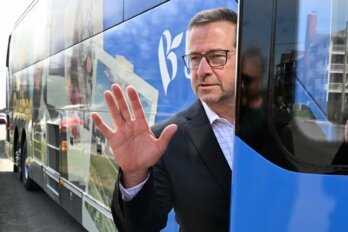On a Tuesday evening in early April, in a community centre in Premier Rachel Notley’s riding in Edmonton, eighteen activists got together to think about how to save the world. The assembled group, which included everyone from young professionals to retirees to one mother who brought along her two kids, belonged to the local chapter of Extinction Rebellion (XR). The recently viral environmental movement was founded in the United Kingdom last year and has since grabbed headlines by blockading landmarks, including London bridges, in its quest to get politicians to address climate change.
XR, which has chapters in at least thirty-five countries, is driven by a sense of urgency around the impending impacts of our changing planet. A new report from the International Panel on Climate Change stressed that climate change will render swathes of the earth uninhabitable within the century unless drastic changes are made. It now appears that we in Canada will almost certainly miss our commitment, made under the Paris Agreement, to reduce greenhouse-gas emissions to 30 percent below our 2005 level by 2030. Instead of being content to continue on with the status quo of incremental changes, members of XR in Canada, drawing inspiration from rising stars like Swedish student Greta Thunberg and US congresswoman Alexandria Ocasio-Cortez, are calling for a rapid move away from of oil-sands, and other fossil-fuel, extraction, with a corresponding government-sponsored economic transition to a zero-emissions economy by 2030.
Members of XR Edmonton got together on that night to brainstorm ways to participate in a worldwide week of civil disobedience slated to begin April 15. The goal of the local chapter is to pressure Alberta’s and Canada’s leaders into initiating a “World War Two–style mobilization” to kick-start a transition to a fossil-fuel-free economy within a decade. A few days earlier, XR Edmonton had participated in a march through the downtown core, which drew more than 100 demonstrators. The scenarios proposed for the week of April 15 ranged from the artistic to the disruptive but typically involved the high-visibility occupation of an Edmonton landmark.
Not on the docket for the evening was a discussion of Alberta’s upcoming provincial election, on April 16. Notley’s NDP may be the most progressive government that the province has had in decades, or ever. But, even so, committed environmentalists may have a hard time cheering for the party. Premier Notley is not an environmentalist, and her promotion of pipelines, such as the stalled Trans Mountain expansion, on the national stage has made her seem like the antithesis of one. Still, her NDP’s approach to the environment is a step removed from that of the conservative governments that preceded her and is at odds with those now itching to regain power. The NDP’s main challenger, the United Conservative Party (UCP)—currently ahead 8 to 19 percent, depending on the poll—has proposed cutting back the modest environmental policies that the NDP spent years putting in place.
One of the questions environmentalists must ask when evaluating Notley, and other progressive candidates across the country, is whether they need to make a decision between being pragmatic and principled. Does Notley represent how far a politician can go to push emissions reductions in Alberta without courting electoral suicide, or could a more ambitious program of drastic emission cuts, like those recommended by scientists, XR, and other environmentalist groups, actually be possible with the right kind of push?
Since its surprise victory in 2015, the Alberta NDP has enacted a series of incremental environmental measures, including the establishment an energy-efficiency agency, the financing of clean-energy and infrastructure projects, and the expansion of protected areas. However, it was its Climate Leadership Plan (CLP), which was announced with much fanfare six months after the party’s victory, that represented the largest cultural shift. The multipronged strategy included a plan to phase out coal electricity generation, to put a cap on oil-sands emissions, and to implement a carbon tax. It also stated the goal of achieving one-third of power generation from renewable sources by 2030.
Notley, however, has also seemed to value the CLP for its ability to grant Alberta the social legitimacy needed to sell oil from the oil sands, which use a steam-heating extraction process that has a large carbon footprint compared to conventional oil extraction. She was quoted in the Edmonton Journal invoking then US president Barack Obama’s rejection of the Keystone XL pipeline and his designation of the oil sands as “dirty oil” as a reason to adopt the CLP.
This strategy of pushing environmental protection as a way to continue destructive resource extraction is a gamble that could alienate all voters. Speaking in the provincial leadership debate on April 4, Notley contrasted her approach to building pipelines with that of her main opponent,
Jason Kenney, a former Harper cabinet minister and leader of the UCP: “I didn’t just talk to echo chambers of people who already agreed with us,” she said. “I spoke to people who were opposed to pipelines, and I changed their opinions.” The result, she said, is that “we’ve gone from four in ten to seven in ten Canadians supporting pipelines.”
Whether her approach will actually satisfy voters remains to be seen. It’s unclear if any of the crude-oil pipelines currently on the drawing board will actually be built (two projects, Keystone XL and Enbridge’s Line 3, are held up in the US regulatory system). The province is now recovering from a recession that started in 2014—induced in part by low oil prices and stalled pipelines—and Notley is facing a sour electorate.
According to pollster Janet Brown of Janet Brown Opinion Research, most Albertans don’t blame Notley for failing to deliver Trans Mountain, which has been suspended by a federal court order pending new consultations. But, says Brown, “they are frustrated that her efforts didn’t result in ‘social licence’ to build pipelines, as she promised it would.” Brown argues that Albertans aren’t entirely convinced that
Kenney’s approach would be more effective than Notley’s, but many residents would like to see their provincial government be more aggressive in pursuing pipelines.
Kenney and the UCP’s approach includes a stated intention to scrap Notley’s signature environmental programs, including the coal phase-out and the provincial carbon tax, and he has announced his intention to challenge the federal carbon tax in court.
The province’s environmentalists will undoubtedly stay away from the UCP. But the question in this election is whether they can still accept Notley and her pursuit of pipelines as the lesser of two evils.
While the NDP faces its critics on the right, environmentalists on the left say that the much-hyped CLP didn’t go far enough. Some parts duplicate existing federal programs, and others have been described as greenwashing. The oil-sands cap, for example, is set at 100 megatonnes of carbon emissions annually. That number is actually about thirty megatonnes above current emissions for the sector.
Still, the program was proactive by Canadian standards. For example, the provincial carbon tax, introduced in 2017, pre-empted the federal tax that came into force this month. One tangible benefit to Albertans is that the province’s program sees the money goes into provincial revenue, instead of to the feds. The Notley government puts this money toward rebates to consumers and toward green investments, including transit expansions, incentives to help consumers switch to more energy-efficient housing, and programs to switch to clean electricity generation in First Nations and Métis communities.
NDP spokesperson Leah Holoiday says that the coal phase-out has already reduced Alberta’s emissions by seven megatonnes a year. (This is a drop in the bucket compared to the province’s total annual emissions of 263 megatonnes, measured in 2016, though Holoiday argues that its programs will equal up to seventy-five megatonnes of emissions savings by 2030.)
All these environmental savings are projected as comparisons to a business-as-usual scenario in which emissions continue to grow. But scientists and researchers are arguing that a slight decline or a levelling off of emissions is not enough—radical cuts are needed to prevent the worst-case scenarios of climate change. Even if Alberta meets the projections in the CLP, the province’s emissions in 2030 will equal about 260 megatonnes, which is roughly what they are today.
Duncan Kenyon is director of the Edmonton chapter of the Pembina Institute, a think tank that advocates for green energy. He says that both government and the environmental lobby have done a poor job of explaining how a carbon tax is an effective tool for reducing emissions and attenuating the destructive effects of climate change, like forest fires, that Albertans are already feeling. “We haven’t brought people along to buy into what we have on paper right now,” he says.
Kenyon argues that the Notley government is facing the consequences of its instrumentalist approach to the CLP. Its vision, says Kenyon was “let’s do this climate-change [mitigation] because it’ll make all the opponents [to our pipelines] go away.” In a world where all crude-oil pipeline options are currently delayed, that approach has left Notley looking like a weak negotiator. Kenyon argues that it would have been more strategic to promote the CLP on its own merits, emphasizing the impacts that climate change is already having on Alberta, like floods and forest fires, and branding the CLP as part of a strategy to fight those natural disasters. He says that Albertans are genuinely concerned about climate change and that neither the NDP government nor advocacy groups have made a forceful enough case for policy that could deal with it. “We never connected that emotional understanding that our economy needs to change,” he says. “We never said, ‘Here is how you do it.’”
In the course of my interactions with the Edmonton chapter of XR, it seemed like the environmentalists’ attitudes to Notley were divided. “[Notley has] done a lot of great things for the province,” said Linda Fontaine, a retired bus driver. “There’s a solar program, and she’s put money into a lot of renewable-energy projects. And, if she gets another term, we’re going to see those things get a lot more financial backing.” Others, like science teacher and Green Party candidate Tanya Herbert, are more critical. “If she gets into power again, it’s going to be a heck of a lot better than any UCP government, which I’m absolutely fearing,” she said. But she can’t avoid looking at the last four years as a partially missed opportunity. “I wish that she would have had the bravery over the last four years to let Albertans see that we’re stronger than oil and gas. We’re more than oil and gas.”
April 15, 2019: A previous version of this story stated that Extinction Rebellion Edmonton had participated in a march a few weeks before their April brainstorming meeting that drew more than 100 protestors to the downtown core. In fact, that march, which occurred on March 15, involved several hundred protestors. A later march on March 30, a few days before their meeting, drew more than 100 demonstrators. The Walrus regrets the error.




